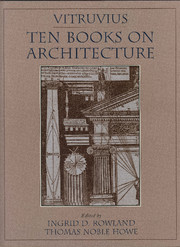Book contents
- Frontmatter
- Dedication
- Contents
- Acknowledgments
- List of Illustrations
- Translator's Preface
- Illustrator's Preface
- VITRUVIUS
- INTRODUCTION
- LIST OF MANUSCRIPTS SEEN
- THE TRANSLATION
- Book 1 First Principles and the Layout of Cities
- Book 2 Building Materials
- Book 3 Temples
- Book 4 Corinthian, Doric, and Tuscan Temples
- Book 5 Public Buildings
- Book 6 Private Buildings
- Book 7 Finishing
- Book 8 Water
- Book 9 Sundials and Clocks
- Book 10 Machines
- COMMENTARY
- Index
Book 10 - Machines
Published online by Cambridge University Press: 18 December 2014
- Frontmatter
- Dedication
- Contents
- Acknowledgments
- List of Illustrations
- Translator's Preface
- Illustrator's Preface
- VITRUVIUS
- INTRODUCTION
- LIST OF MANUSCRIPTS SEEN
- THE TRANSLATION
- Book 1 First Principles and the Layout of Cities
- Book 2 Building Materials
- Book 3 Temples
- Book 4 Corinthian, Doric, and Tuscan Temples
- Book 5 Public Buildings
- Book 6 Private Buildings
- Book 7 Finishing
- Book 8 Water
- Book 9 Sundials and Clocks
- Book 10 Machines
- COMMENTARY
- Index
Summary
PREFACE
1. In the celebrated and spacious Greek city of Ephesus, there is said to be an ancient law established by the forefathers, harsh in its requirements but by no means partial in its justice. For an architect, when he has received the commission for some public work, promises in advance what the cost is to be. Once this estimate has been turned over to the magistrate, his goods are put in lien until the work is completed. Then, when it is finished, if the actual expenses correspond to the estimate, he is awarded special decrees and honors. Likewise, if it has exceeded the estimate by no more than one-quarter of the total, the difference is supplied by the public treasury and he is not obliged to pay any penalty. If, on the other hand, more than a quarter has been consumed by the project, then money is taken from his own assets to make up the difference.
2. If only the immortal gods had made it so that this law had also been adopted by the Roman People, not only for public buildings but also for private ones! Then the inexperienced would not run riot with impunity, and those who were well versed in the subtleties of the highest learning would practice architecture without hesitation. Neither would the heads of households be led on to an endless profusion of expenditures, so that they are even evicted from their own properties. The architects themselves, restrained by the fear of penalty, would be more careful and thorough in reckoning and declaring their estimates, so that heads of households would proceed with their buildings within the budget they had prepared, or adding only a little more. For people who can assemble four hundred thousand [sesterces] for a project will still be kept interested by the pleasure of anticipating its completion if they must contribute another hundred,* whereas those who are burdened with a subvention of half again and more are forced to give up entirely, hope renounced and money squandered, financially and spiritually bankrupt.
- Type
- Chapter
- Information
- Vitruvius: 'Ten Books on Architecture' , pp. 119 - 134Publisher: Cambridge University PressPrint publication year: 1999



